Eleven Psychological Scientists Receive APS’s 2021 Lifetime Achievement Awards: Association’s Highest Honors Recognize Outstanding Contributions to Science

The Association for Psychological Science (APS) is pleased to announce its lifetime achievement award recipients for 2021. As the premier international organization dedicated to advancing scientific psychology across disciplinary and geographic boarders, APS represents more than 30,000 leading scientists, academics, clinicians, researchers, educators, administrators, and students from more than 80 countries. APS’s three lifetime achievement awards—the APS James McKeen Cattell Fellow Award, the APS Mentor Award, and the APS William James Fellow Award—are APS’s highest honors, and their recipients represent the field’s most accomplished and respected scientists.
“As the professional home to the international psychological science community, APS is delighted to honor the outstanding members in our field,” said APS President Shinobu Kitayama (University of Michigan). “We congratulate these winners and applaud their important contributions to science and mentoring.”
2021 APS James McKeen Cattell Fellow Award Recipients
The APS James McKeen Cattell Fellow Award recognizes APS members for a lifetime of outstanding contributions to the area of applied psychological research. Recipients must be APS members whose research addresses a critical problem in society at large.
- Alison Gopnik, University of California, Berkeley, is considered an outstanding leader in the fields of developmental psychology, cognitive science, and philosophical psychology.
- Megan R. Gunnar, University of Minnesota, is widely recognized as a pioneer and leader in the study of stress’s effects on development.
- Saul M. Kassin, John Jay College of Criminal Justice and Williams College, is recognized for his formative work on the scientific study of criminal confessions.
2021 APS Mentor Award Recipients
The APS Mentor Award recognizes psychology researchers and educators who have shaped the future directions of science by fostering the careers of students and colleagues.
- BJ Casey, Yale University, has contributed significantly to the development of female scientists in STEM-related academic positions and is recognized for advancing our understanding of the developing human brain.
- Harald L.G.J. Merckelbach, Maastricht University, The Netherlands, has supervised approximately 50 PhD students and post-docs and is recognized for his work on dissociation, repressed memories, and malingering.
- Miguel Moya, University of Granada, Spain, is credited with having a profound impact on the professional development of his students and with the development of social psychology as a top-level academic discipline in Spain.
- Elizabeth Spelke, Harvard University, has helped dozens of mentees launch careers rooted in unique, rich research questions and is known for her expertise on the cognitive capabilities of young children.
2021 APS William James Fellow Award
The APS William James Fellow Award honors APS members for their lifetime of significant intellectual contributions to the basic science of psychology. Recipients must be APS members recognized internationally for their outstanding contributions to scientific psychology.
- Michelene T.H. Chi, Arizona State University, is recognized for her contributions to the fields of learning science, cognitive science, and education.
- Dante Cicchetti, University of Minnesota, is considered one of the founding researchers in the field of developmental psychopathology.
- Nancy G. Kanwisher, Massachusetts Institute of Technology, is considered one of the most influential and widely respected vision scientists and cognitive neuroscientists in the world.
- James W. Pennebaker, The University of Texas at Austin, is known for groundbreaking contributions to research areas including natural language use, bodily perception, and the benefits of expressive writing.
The 2021 award recipients will be honored publicly in 2021. Please contact Charles Blue at cblue@psychologicalscience.org for more information.




